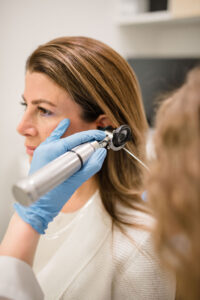Do you hear a ringing, buzzing, or humming in your ears that no one else seems to notice? That sound is called tinnitus, and you’re not alone. Tinnitus affects about 1 in 5 adults at some point in their lives (Statistics Canada, 2019).
While there isn’t a universal “cure,” many effective treatment options can reduce the impact of tinnitus and help you regain peace of mind. If you’re searching for tinnitus treatment in Halifax, here’s what you need to know.
What Is Tinnitus?
Tinnitus isn’t a disease itself, it’s a symptom. It usually sounds like ringing, buzzing, humming, or hissing in one or both ears. For some, it’s mild and temporary. For others, it can be constant and disruptive to daily life.
 What Causes Tinnitus?
What Causes Tinnitus?
There are many possible triggers, including:
Hearing loss: Damage to the inner ear is the most common cause. Up to 90% of people with tinnitus also have hearing loss (Henry et al., 2005).
Earwax buildup: Blockages can change pressure in the ear canal.
Noise exposure: Concerts, earbuds, or loud workplaces can trigger lasting damage.
Medications: Some antibiotics, chemotherapy drugs, and pain relievers are damaging to the ear.
Other health factors: Stress, jaw problems (TMJ), or circulatory issues can play a role.
When to See an Audiologist
Not all tinnitus is serious, but you should book an assessment if:
- It’s constant or getting worse
- It interferes with your sleep, focus, or daily life
- It occurs alongside sudden hearing loss, dizziness, ear pressure or ear pain
Our highly trained audiologists in Halifax can help identify whether hearing loss, wax buildup, or another issue is contributing.
Tinnitus Treatment Options at Clayton Park Audiology
At Clayton Park Audiology, we take a personalized approach to tinnitus care. Depending on your needs, treatment may include:
1. Tinnitus Evaluations
We start with a full hearing test and specialized tinnitus assessment to understand your unique sound experience.
2. Sound Therapy
Hearing aids or sound generators can mask tinnitus by introducing gentle background sounds. Research shows this reduces how noticeable tinnitus feels over time (Hoare et al., 2014).
3. Hearing Aids
If hearing loss is present, hearing aids can both improve hearing and reduce tinnitus annoyance. Studies show many patients experience relief once hearing is restored (Henry et al., 2015).
4. Counselling & Coping Strategies
Tinnitus can be stressful. Education and counseling can help reframe the condition, reduce anxiety, and improve quality of life (Martinez-Devesa et al., 2010).
5. Ear Wax Removal
For some, the solution is simple. Clearing wax blockages may eliminate or reduce tinnitus immediately.
Living Better With Tinnitus
Tinnitus doesn’t have to control your life. With the right support, you can:
-
Reduce stress and frustration
-
Sleep better
-
Focus more easily at work or school
-
Enjoy social situations without distraction
FAQs
Is there a cure for tinnitus?
There is no single cure, but many people experience significant relief with sound therapy, hearing aids, or management strategies.
Will tinnitus go away on its own?
Sometimes, especially if caused by temporary noise exposure or medication side effects. But if it’s ongoing, it’s worth booking a professional assessment.
Does stress make tinnitus worse?
Yes. Stress and anxiety can amplify how noticeable tinnitus feels. Relaxation techniques often help alongside treatment.
Take the Next Step
If you’ve been searching for tinnitus treatment in Halifax, our audiologists are here to help. At Clayton Park Audiology, we’ll create a plan tailored to your specific needs, whether that’s sound therapy, hearing aids, or wax removal.
Call 902-405-0515 or book online at cpaudiology.ca to schedule your tinnitus assessment today.
References
-
Henry JA, et al. (2005). General review of tinnitus: prevalence, mechanisms, effects, and management. J Speech Lang Hear Res.
-
Henry JA, et al. (2015). Pilot study to develop telehealth tinnitus management for persons with and without hearing loss. J Am Acad Audiol.
-
Hoare DJ, et al. (2014). Sound therapy for tinnitus management. BMJ.
-
Martinez-Devesa P, et al. (2010). Cognitive behavioural therapy for tinnitus. Cochrane Database Syst Rev.
-
Statistics Canada. (2019). Hearing difficulties and tinnitus, 2019.

Author
Lyndsay Bozec
REGISTERED AUDIOLOGIST, NSCASLP
Lyndsay is a passionate advocate for hearing health awareness and hearing preservation. Over the years she has delivered various hearing health presentations and hearing aid workshops for caregiver workshops across HRM.
